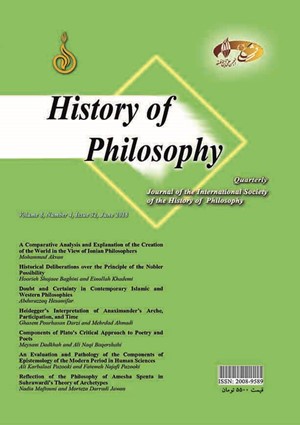Components of Plato’s Critical Approach to Poetry and Poets
Subject Areas : Philosophical thoughts in ancient IranMeysam Dadkhah 1 * , Ali Naqi Baqershahi 2
1 -
2 - دانشگاه بين¬المللي امام خميني (ره) قزوين
Keywords: Plato poetry poets Utopia Paedea beauty ,
Abstract :
In his Republic, after denouncing Athenian poetry and poets in certain sections, Plato decrees their deportation from his Utopia in the 10th book of the same work. At the same time, however, Plato’s own works abound in poetic concepts, and wherever he talks about poets, he uses a language which is both hesitant and respectful. Accordingly, this paper is intended to provide some answers to the following questions: which truth underlies such a paradoxical attitude? How could Plato’s approach to poets be explained? What is the main object of Plato’s criticism: Athenian poets’ use of poetry or the essence of poetry itself? Or, should one seek for the response elsewhere and perhaps find the problem in the addressees of poetry? The authors believe that, if one agrees that one of the important elements of poetry in Athens was to believe in an epistemological aspect for sophist teachings, and if one assumes that, beyond ontological and epistemological discussions, Plato’s first problem is basically politics and the establishment of an organized political system, it can be concluded that, in this Utopia, the Athenian poetic tradition and its specific features are not consistent with Plato’s political ideas. The reason is that if one considers paedeia or a system of education to be necessary for the establishment of Utopia, if the intended paedeia is based on mythology and sophists’ teachings as its epistemological origin, it will be doomed to failure from the beginning. Moreover, one can approach this problem from the epistemological aspect of Plato’s philosophy and speak of the distinction between aesthetic beauty, as we know it today and as it is manifest in works of art, and the Ideal beauty or the same truth, as intended by Plato. In his view, the aesthetic view of beauty is a subcategory of Ideal beauty; hence, by the word “beautiful”, he does not merely mean the values that are involved in today’s concept of aesthetics. Rather, he has ethical and epistemological values in mind as well. Therefore, the discussion of the dismissal of poets from Utopia must be revisited under the category of general and particular senses of beauty.
افلاطون، جمهور، ترجمة فواد روحاني، تهران، انتشارات علمي فرهنگي، 1386.#
افلاطون، دوره آثار، ترجمة محمدحسن لطفي، تهران، انتشارات خوارزمي، 1367.#
افلاطون، قوانين، ويليام کيت چمبرز گاتري، ترجمه محمدحسن لطفي، تهران، انتشارات فکر روز، 1378.#
الياده، ميرچاه، چشماندازهاي اسطوره، ترجمه جلال ستاري، تهران، نشر توس، 1362.#
تاتار کيويچ، وواديسواف، «زيباييشناسي افلاطون»، ترجمه سيدجواد فندرسکي، اطلاعات حكمت و معرفت، س6، ش4، 1390.#
كانت، ايمانوئل، نقد قوة حكم، ترجمه عبدالكريم رشيديان، تهران، نشر ني، 1393.#
گئورگ گادامر، هانس، «افلاطون و شاعران»، ترجمه يوسف اباذري، ارغنون، ش14، 1378.#
مددپور، محمد، هنر و زيبايي در نظر متفکران يونان و رم، انتشارات سوره مهر، چ3، 1390.#
Cornford, F.M., From Religion to Philosophy, New York, Harper Torchbook, 1957.#
Friedlander, Paul, Plato, Princeton Univesity Press, 1970.#
Halliwall, Stephen, “Plato”, in A Companion to Aestetics, D. Cooper: Blackwell, 2009.#
Moss, Jessica, Plato’s Republic, New York, Cambridge University Press, 2007.#
Ralkowski, Mark, Heidegger’s Platonism, Continum, 2009.#
Ross, David, Plato’s Theory of Ideas, London, Oxford University Press, 1999.#
Sheppard, D.J., Plato’s Republic, Edinburgh University Press Ltd, 2009.#

